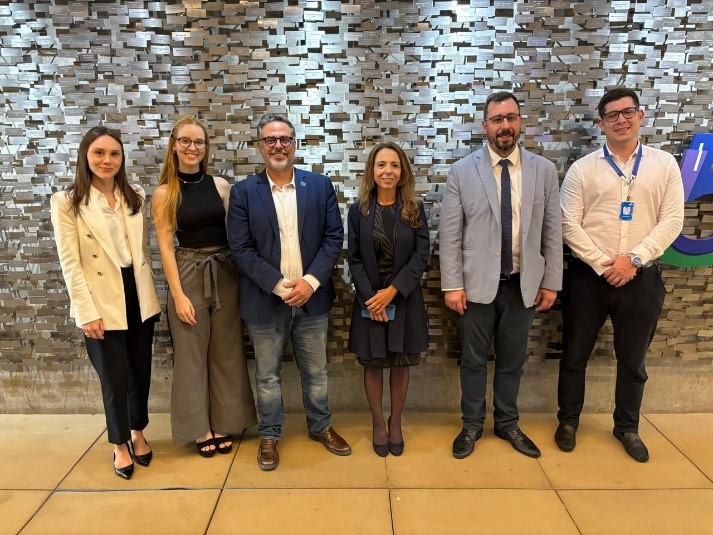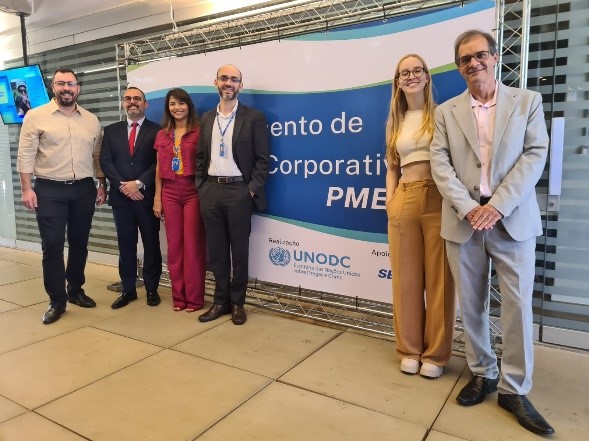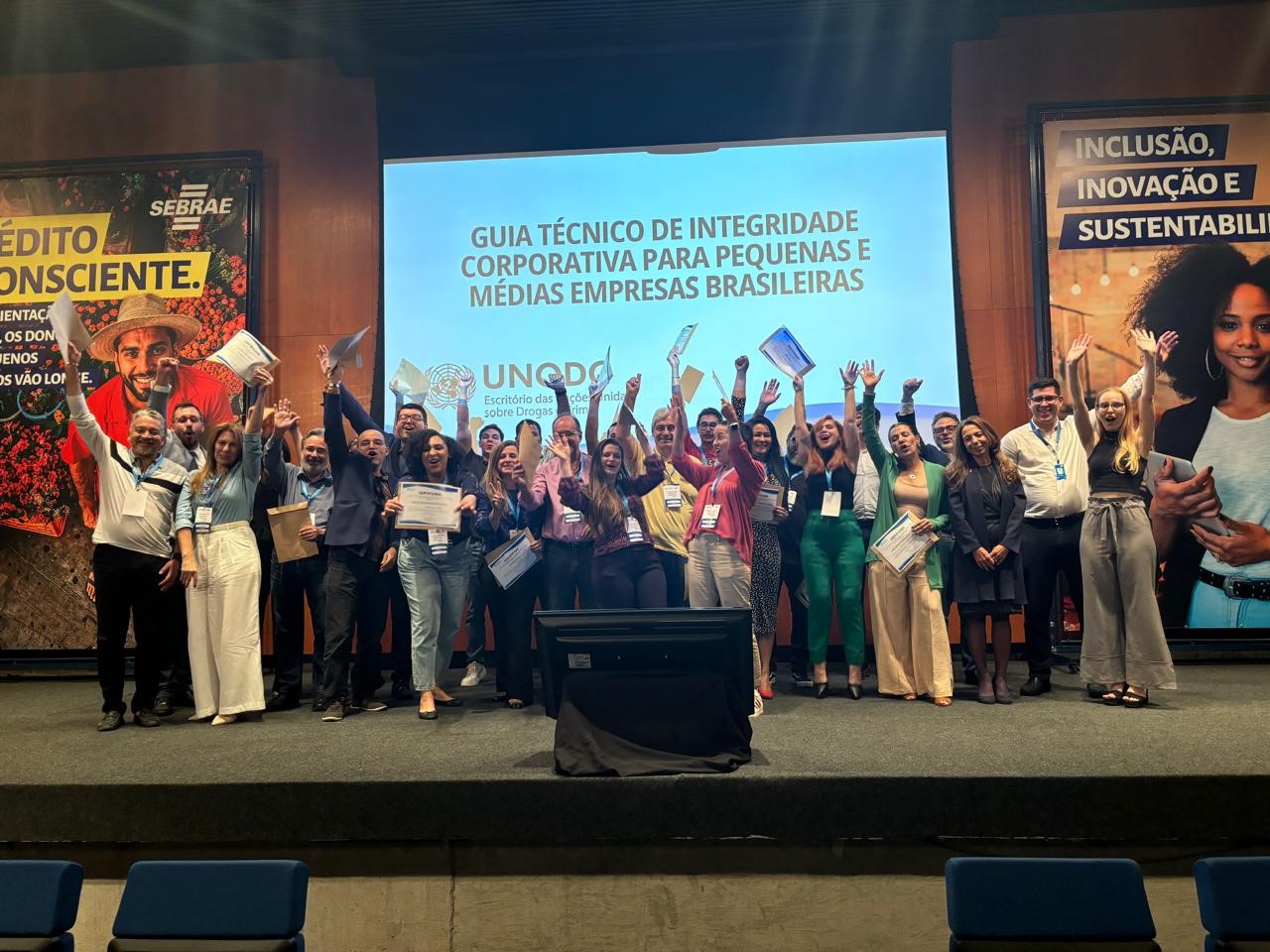
Brasilia, 12 August 2024 – The United Nations Office on Drugs and Crime (UNODC) in Brazil concluded the Corporate Integrity Training for Small and Medium-sized Enterprises (SMEs), with the institutional support of SEBRAE. The sessions were attended by 35 representatives from 25 Brazilian micro, small and medium-sized companies.
The aim of the training, divided into three sessions of one shift each, was to disseminate applied knowledge and promote corporate integrity among the participating SMEs, based on the introduction of Brazilian regulatory frameworks (Anti-Corruption Law - Law No. 12.846/2013, Decree No. 1.129/2022, CGU Ordinance No. 909/2015; New Law on Tenders and Administrative Contracts - Law No. 14.133/2021) and international ones, with emphasis on the United Nations Convention against Corruption (UNCAC).
Over the course of the three sessions, participants learned about the basic concepts of Business Integrity, including considerations of UNCAC, global and national standards, as well as identifying and mitigating corruption risks inherent in work activities and national and international opportunities for further learning on corruption prevention. As a final task, the participants developed a corruption risk mitigation plan adapted to the reality of their companies, indicating the main risks identified. According to the participant Pablo Coelho Ferreira, from the company Produtiva, the adoption of integrity measures “is not just a safeguard, but helps the company to be better, producing more effectively and efficiently”.

In addition to SEBRAE's institutional support, the training was attended by the Secretariat for Private Integrity of the Office of the Comptroller General (CGU), the Global Compact Brazil Network, the Alliance for Integrity, ICC Brazil and the Compliance Department of Siemens Brazil.
For attendee Patrícia Lopes, the training has already borne fruit: “We came to the training with the intention of growing and seeking more knowledge, and we're already reaping the rewards. I did not realise this could happen so quickly. We're taking part in a long-running tender, and it was the first time in the nine years we've been working in this sector that we've seen a tender requiring the bidder to have knowledge of compliance and a corruption risk mitigation plan. As we had the opportunity to take part in this course, we already have the know-how and something to present, which will even serve as a portfolio for our company.’

The Corporate Integrity Training for SMEs is the latest delivery of the Global Action for Corporate Integrity Project in Brazil, which has been implemented by UNODC since March 2021 in eight countries. The project sought to encourage advances in corruption prevention, improving and qualifying transparency and integrity, improving communication between the public and private sectors, civil society and academia, promoting a common means of dialogue and knowledge sharing, by offering guidance to small and medium-sized enterprises for the adoption of anti-corruption and integrity systems and programs.
In addition to the Training, UNODC Brazil held the Coding4Integrity Hackathon in 2022, aimed at developing digital, efficient and innovative ways to implement UNCAC. Held in São Paulo, the event brought together 46 young people from Brazil and Mexico, including developers and students. The winning team was made up of four Brazilian computer engineering students from the State University of Campinas (Unicamp) and a Mexican law student from the Autonomous University of Nuevo Léon. They presented the idea of a gender-sensitive whistleblowing system capable of detecting and preventing gender-based corruption from damaging employees and corporate communication channels.
Another success of the project was the unprecedented research on the Promotion of Integrity based on Risk according to the New Law on Tenders and Administrative Contracts (Law No. 14.133/2021), considering the entry into force of the law in 2024. The research was launched at a hybrid event, in person at the Serzedelo Corrêa Institute, at the Federal Court of Auditors (TCU), in Brasília, DF, and on the YouTube channels of UNODC, TCU and CGU, in August 2023. The survey included an Integrity Risk Matrix, a tool developed by UNODC to help different government bodies at national, state and municipal levels to identify corruption risks before and during bidding processes. For the Comptroller General of the Municipality of São Paulo, “the study provided was a crucial source of insights and data that allowed us to develop and implement effective strategies in our city. Its rigorous research and in-depth analysis were key to our fuller understanding of the challenges we face and possible solutions.”
Seeking to strengthen transparency and control in interactions between the public and private sectors in Brazil, UNODC also carried out a survey of the social perception of institutional and government relations professionals regarding the regulation of lobbying in Brazil. The survey, which is unprecedented in the country, involved 123 institutional and government relations professionals and 25 stakeholders. The main findings of the research were presented to professionals representing the Office of the Comptroller General (CGU), the Institute of Institutional and Government Relations (IRELGOV), the Brazilian Association of Institutional and Government Relations (ABRIG), the Association of State Audit Courts (ATRICON), the National Council for Internal Control (CONACI), the National Confederation of Industry (CNI) and the law firm Britto Brandão Minc Adv., during a meeting held at UNODC premises, in Brasilia, in March 2024.
UNODC work on the project was based on the UNCAC, with an emphasis on Article 12, which deals with the commitments of the Private Sector. Throughout the three years of activities, the events and training sessions held by the project were attended by 370 people, representing institutions from the public and private sectors, civil society and academia.
Find out more about UNODC's work on the issue here.